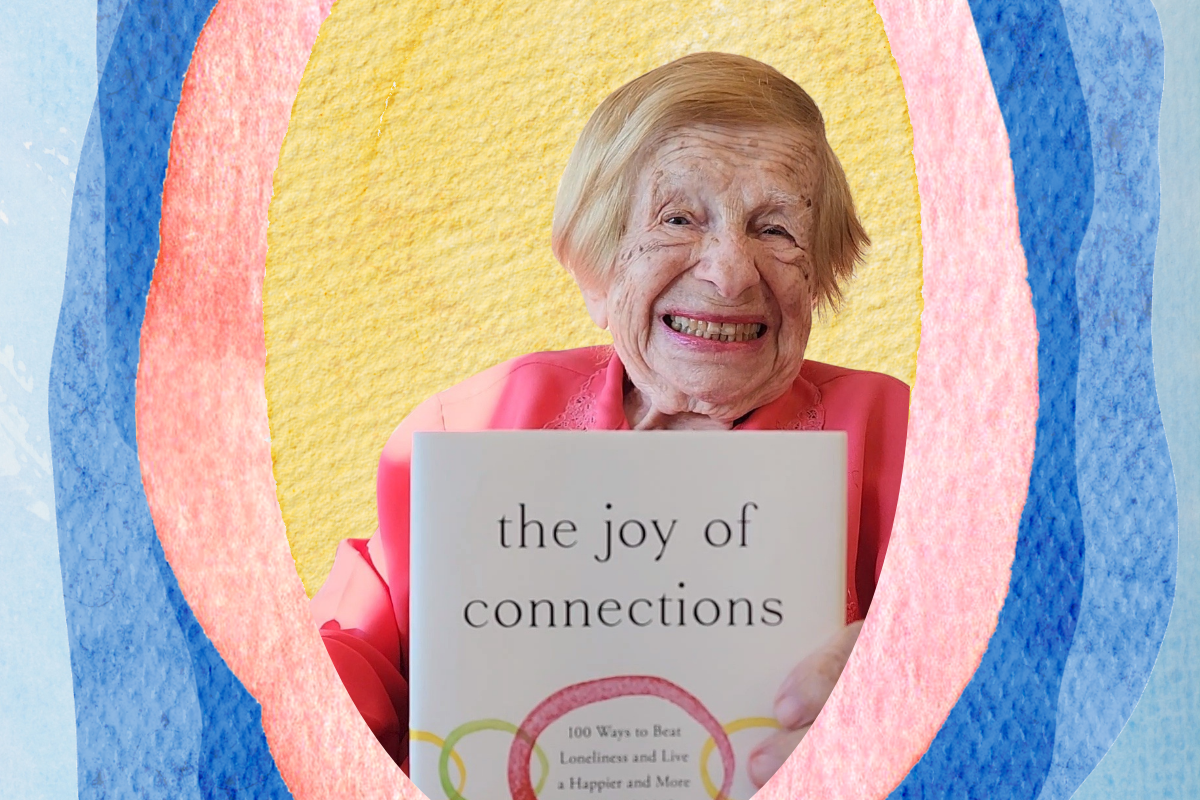When everyone’s favorite sex positive, high energy grandmother Dr. Ruth passed away in June at 96, it was a loss deeply felt across generations, genders and politics. Fortunately for us, she never stopped working or keeping busy and the new instructive, captivating book, “The Joy Of Connections: 100 Ways To Beat Loneliness And Live A Happier And More Meaningful Life,” written by Dr. Ruth K. Westheimer, journalist and author Allison Gilbert and Dr. Ruth’s “Minister Of Communications,” Pierre Lehu, is the first of many projects to come that will continue her legacy.
Like so many during the pandemic, Dr. Ruth understood that loneliness and isolation, taboo subjects in our culture that had long been doing damage, were having significant ripple effects on mental and physical health, and not just for older adults. COVID also compounded her longstanding concerns about the effects of smartphones on our daily lives.
Dr. Ruth is uniquely qualified to write about loneliness because she experienced it for years, starting from a very early age. When she was 10, her parents put her on a Kindertransport from Germany to save her from being sent to a concentration camp. She lived out the war in a Swiss orphanage, never seeing her family again. She wrote in her diary how, “above all, I’m longing for a friend,” someone who would provide comfort, remember her birthday and notice her. When she was in her 20s, at just 4’7” — a height she was convinced meant she would never find a partner — she served as a sniper in Israel and was injured, causing her to believe she was even uglier and more unlovable. Later, she fell in love after all and got married, but ultimately divorced, and was a single parent stuck at home, unable to afford to go out and visit her friends. The lack of effort and interest from them left her angry and resentful.
In her work over the last half-century as a sex therapist, she worked with clients with AIDS, intimacy issues and sexual dysfunction. Her desire to help them fueled her work, and she realized that shame plays a key role in the way society views sexual health. She recognized that there’s also a stigma around someone admitting they are lonely, feeling unsupported or not having their basic emotional needs met.
She directed her observations toward New York Governor Kathy Hochul’s office and in November of last year, Hochul appointed Dr. Ruth as the state’s Ambassador to Loneliness. Health issues prevented her from being the spokesperson she had hoped to be in the position, and instead, she decided to use the written word to share her strategies for better approaching loneliness. The result is “The Joy Of Connections: 100 Ways To Beat Loneliness And Live A Happier And More Meaningful Life.”
The book, part self-help and part memoir, follows the USDA food group plate, but instead of suggestions for what to eat, it offers a “menu for connection.” The chapters are organized by importance, starting with Self, Family, Friends and Lovers, Community and Technology. Her suggestions are practical and very doable; some examples include performing an act of kindness, getting a dog, preparing what to say before going into a room full of strangers or taking a class. And her advice is to accept your “reality” rather than fight it. She shares how she learned that she couldn’t be passive with her friends when they let her down. Instead, she decided she would have to take the initiative to foster their connections, landing on the brilliant solution of throwing dinner parties. The text instructs its readers to be intentional and purposeful with relationships, and reminds us that we must curate and nurture them.
Earlier this month, I attended a program about the book at the New York Public Library. Dr. Ruth’s children, Joel and Miriam, were in attendance, along with her co-authors Allison Gilbert and Pierre Lehu. While waiting for the discussion to start, the audience was encouraged to chat with the people near us, which I did. After the event was underway, the woman next to me noticed I was awkwardly trying to take notes on the little paper I had and graciously offered me the library notepad she had just gotten. I’m not sure such a gesture would have happened elsewhere; it felt like an easy connection had been formed so swiftly. I think it’s a testament to the ways Dr. Ruth touched the lives of so many people, and a sign that the book is already accomplishing what she hoped it would.



